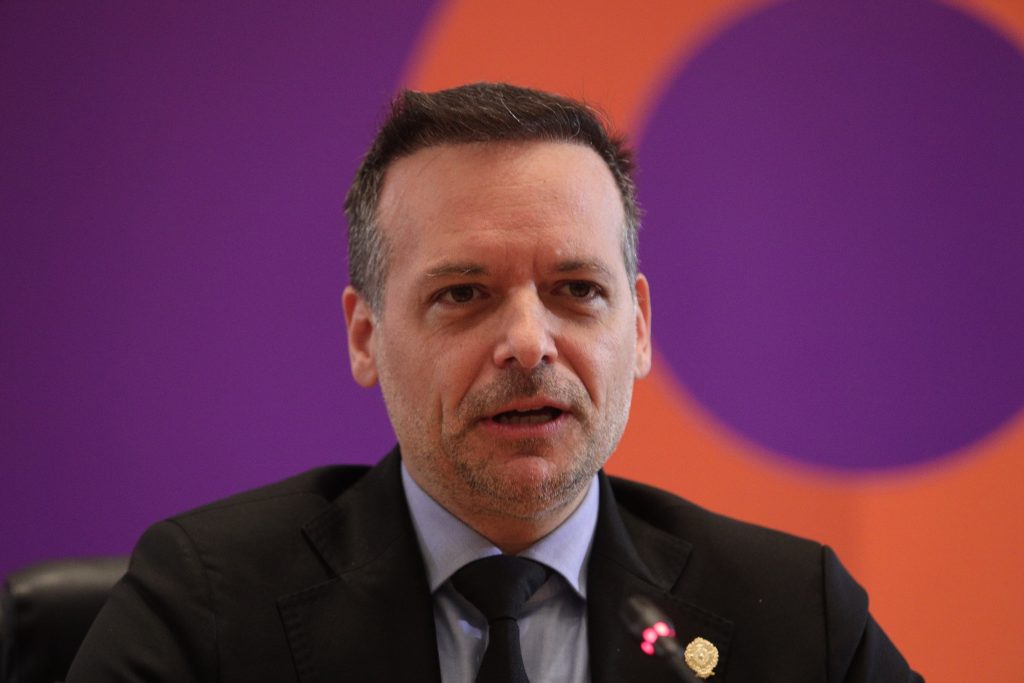The need for Greece and Turkey (Türkiye) to keep all channels of communication open was the main point made this month by the head of the Turkish presidency’s directorate of communication, Fahrettin Altun, in an interview with “Ta Nea”.
Speaking less than two weeks before Turkish President Recep Tayyip Erdogan returns to Athens for a working visit, which will coincide with the holding of a bilateral High Level Cooperation Council (HLCC) after a seven-year hiatus, Altun said he does not believe the ongoing Israel-Hamas war in the Middle East will affect relations between the two countries. In fact, he stressed that both Athens and Ankara can “become stronger by facing challenges together.”
At the same time Altun, who serves as a presidential spokesman, said bilateral relations require mutual trust and patience, as well as what he called the avoidance of “escalatory rhetoric”.
The interview follows:
After three years of tension between Athens and Ankara, Greece and Turkey have opened all channels of communication. Is there a willingness to resolve issues and differences that require compromises? Are the two countries ready for mutual concessions? Could such concessions include the Turkey-Libya memorandum on maritime zones, for example?
Nobody benefits from tension. We should admit that we have to deal with longstanding issues and most of them are inter-related and complex, however we can solve them to the benefit of our future generations. We both owe our children good neighborly relations like we experienced during the times of Atatürk and Venizelos. The handshake between them was a big step towards the future. We must continue with these steps. Our countries are in the same Alliance and we have much better circumstances today. And we have common challenges, too.
Therefore, we should keep all channels open. We must talk to each other, and not to others about each other. Such a common understanding would help building more trust and respect towards each other’s sensitivities and vital interests. As long as we have more transparency, predictability and the sense of good neighborliness, both our countries will have enough space to solve our differences.
If there are no solutions, is there a way to avoid tensions between the two sides and maintain a balance? What is the role of statements by politicians and the role of media?
The longstanding issues between Türkiye and Greece are of a complex nature. Their solution requires mutual trust, efforts, sincere and constructive dialogue, and of course patience. While we seek solutions, it is important to avoid escalatory rhetoric. Politicians should refrain from provocative statements that attract the media’s attention. When we look at the Greek media, we regrettably observe that there are still numerous articles and commentaries on Türkiye which do not reflect the truth and adversely affect Greek public opinion. Public opinion is important in the sense that it constrains decision makers. A constructive media attitude will reflect positively on public opinion, which in turn will give politicians the necessary freedom to advance bilateral relations.
Greece and Turkey have completed the roadmap for dialogue decided by Mitsotakis and Erdogan and are moving towards the High Cooperation Council on 7 December. What is its significance and what agreements do we expect to be signed?
After an interval of seven years, the 5th High Level Cooperation Council (HLCC) will convene on 7 December in Athens. This is a significant development considering our tense relations in the previous year. Thanks to solidarity diplomacy and increased contacts we have ushered in this new period in our relationship and we have the will to continue this positive trend. Both countries should seize this opportunity to find solutions to our longstanding issues.
The 5th HLCC is significant in the sense that it demonstrates the political will to further improve our relations. It gives a very positive signal to the public opinions of both countries. Preparations are underway to attain as many deliverables as possible during the HLCC. We are in regular contact to finalize various agreements, memoranda of understanding (MoUs) and joint declarations until the HLCC. Agreements and MoUs on economy, agriculture, education, energy, health, transport, environment, disaster management and sports are expected, as well as a joint political declaration.
One of the common challenges facing Greece and Turkey is the migration issue. How can they cooperate and with what kind of targeting?
Neither Türkiye nor Greece are the source of irregular migration. They both face the same challenges. Therefore, they need comprehensive cooperation, both at sea and on land. We believe that our common priority should be ending the loss of life in the Aegean and on the ground. Our relevant authorities are now working towards establishing efficient cooperation mechanisms. The Turkish Minister of the Interior, Mr. Ali Yerlikaya, recently hosted the Greek Migration Minister, Mr. Dimitris Keridis, for bilateral talks in Ankara. Since the migration issue concerns separate ministries in Greece, similar meetings with other Greek Ministers would also be useful in the near future. While these dialogue efforts are underway, provocative and counter-productive statements that benefit no one should be avoided.
How do you see developments on the ground in the Gaza war? What impact can it have on the wider region? Are you concerned about destabilization?
Since October the 7th, one of the greatest tragedies of recent history has been unfolding before our eyes. We all need to do our best to deescalate the situation to avoid a spillover. However, the United Nations Security Council, that is responsible for preserving peace, has failed to discharge its duties. Millions of people take to streets all around the world to protest the war crimes committed by Israel. Awareness as to the injustice against Palestinians over the course of decades is raising widely.
Nearly 2,3 million Palestinians in Gaza are deprived of food, water, electricity, medicine and fuel. Over 1 million is displaced across the Gaza Strip. Residential buildings, hospitals, schools, refugee camps and places of worship are constantly targeted. This has gone beyond self-defense and turned into collective punishment of a population, constituting a clear violation of international law, including international humanitarian law and human rights law.
Spill over into other parts of the region would only be disastrous. The international community must give correct messages to Israel. It is time to help deescalate rather than provoke further military action. Therefore, a ceasefire is a pressing need. Provision of unhindered and sufficient humanitarian aid into Gaza for civilians is also a must.
The Palestine-Israel conflict is a matter of justice and conscience and should be above daily politics. The current crisis once again shows us that without addressing the root causes of the Palestine-Israel issue there will be no lasting peace. A lasting peace in the Middle East can be possible only through embodiment of an independent, sovereign and geographically contiguous State of Palestine on the 1967 borders with East Jerusalem as its capital. A settlement as such with a guarantee mechanism for its implementation is needed at the moment.
Can the different positions of Greece and Turkey regarding the war in Gaza affect the Greek-Turkish dialogue and threaten a return of tension in relations between the two countries or the opposite? Does the crisis in the region make both Athens and Ankara have an additional reason to seek good relations with each other to avoid an additional front?”
As you know, Türkiye and Greece have differing positions on a number of issues, not only on the war in Gaza. These differences of opinion have nevertheless not prevented us from initiating a new, positive phase in our bilateral relations. No two countries, not even neighbors, can be expected to align on every matter of international concern. I think it’s safe to say that since we have been successfully avoiding tensions resulting from bilateral concerns for many months now, no tensions will ensue because of differing views on other issues. Of course, our common goal as neighbors and NATO allies should be the prevention and avoidance of crises in general, both between ourselves and in our region and beyond. I think you will agree that Türkiye and Greece can both become stronger by facing challenges together.



